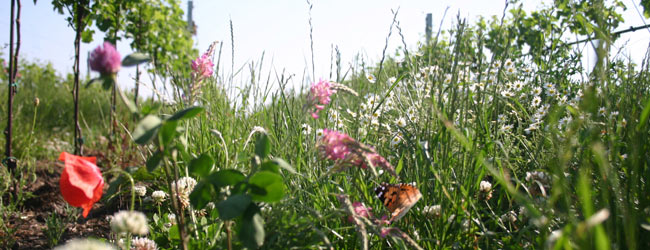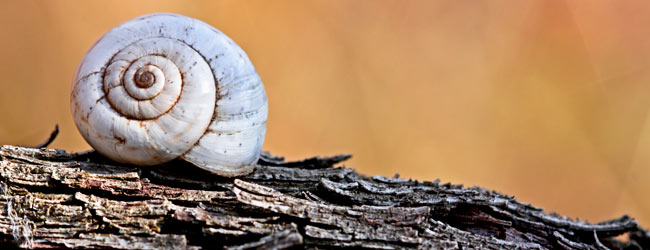
Delinat: The most demanding organic guidelines in Europe
The key principle of quality-oriented viticulture according to the Delinat method is based on the systematic promotion of biodiversity (see also the video, Was ist eigentlich Biodiversität? (What is biodiversity actually?). The Delinat method sees the vineyard as an ecosystem, the balance of which is only achieved by means of the integration of biological diversity. The vineyards are to be transformed into stable ecosystems with wildlife-friendly hedgerows, fruit trees and secondary crops such as vegetables, aromatic herbs and a wide variety of greenery. More on that: Charter for Biodiversity in Vineyards.
First organic guidelines for viticulture
There have only been legal guidelines for the designation “organic wine” in the EU since 2012. As long ago as 1983, Delinat created its own organic guidelines for viticulture and wine production in Europe. These have been constantly adapted to take account of the latest findings. They go far beyond any general requirements for organic farming and are also stricter in many respects than other organic guidelines (EU, Bio Suisse, Demeter, see table below on this page).
In addition to a ban on chemically synthetic insecticides, the use of artificial fertilisers and gene technology, the Delinat guidelines were, for example, the first to demand the promotion of biodiversity and greatly restrict the use of copper and sulphur to combat disease in the vineyard. Additives and interventions for the preservation (sulphur), fining and filtration of the wines are greatly restricted in vinification. There is a total ban on animal-based additives, so all Delinat wines are considered to be vegan.

The Delinat guidelines are based on a graduated model with each level identified by means of one, two or three snails. Even the first level is far stricter than the EU organic regulations. Compliance with the guidelines is monitored by the Swiss organic control and certification agency, bio.inspecta, in cooperation with the national organic control agencies.
Soil management and fertilisation
The Delinat method attempts to maintain a year-round, species-rich greening of the vineyard. Carefully selected plant mixtures or wild flowers ensure the largely autonomous provision of nutrients for the vines. A diverse multitude of flowers enhances the ecological balance and offers a habitat for insects. Irrigation of the vines should be avoided if at all possible. In the case of businesses with irrigation, the Delinat method requires measures for water retention for the purpose of permaculture.

The vineyard ecosystem
The vineyard itself becomes an ecologically valuable cultivation area. Monoculture is broken up. The vineyard ecosystem is stabilised and harmonised by means of biodiversification insofar as pest-control measures can be reduced. Trees, shrubs, flowers, piles of stones and wood and ecological compensatory areas are intended to turn the vineyard into an attractive area for insects, birds and small animals.
Pest control
The aim is to create a type of viticulture that requires as little intervention as possible. This is achieved by means of robust, fungus-resistant grape varieties (PIWIs), as well a rich variety of accompanying flora, compensatory areas, secondary crops, insects, soil-dwelling organisms and small animals. The vines are strengthened with plant-based and bioactive preparations reducing to a minimum any copper or sulphur to counteract fungus. The aim is to do entirely without copper and sulphur or at least to greatly reduce their application. The Delinat guidelines provide for a reduction in the quantities applied each year.
Research and trials
Organic wine producers that work close to nature and are therefore particularly exposed to the fluctuations and caprices of the weather have to continually develop the methods they use. For that reason, the Delinat guidelines were drawn up as a dynamic programme to formulate the future of viticulture. And for that same reason, Delinat invests one per cent of its turnover in research.
Pressing and bottling
The Delinat method enables the development of highly aromatic grape quality. The wines are the genuine fruit of a balanced terroir with high biodiversity. These wines are naturally stabilised. They require only few additives, if any. Additives of animal origin are not permitted. Natural cork has proven to be the most ecologically appropriate seal.
Social matters
The basic human rights of all the employees of Delinat wine producers are respected and they are employed, encouraged and motivated in accordance with their skills and needs.
Documentation
All the activities of the Delinat wine producer are carefully documented, in the business journal, plot lists and plans, as well as in the cellar register.
Sustainability
Delinat vineyards meet all the requirements of a business form that combines commercial thinking and action with an extremely high standard of climate protection, energy efficiency, the use of renewable energies and ecology. From 2021, each Delinat vineyard has to cover at least 30% of its total energy requirements from self-generated, renewable sources for the lowest level of the guidelines (one snail). To achieve the highest level (three snails), the vineyard must generate 100% of its energy requirements itself on the basis of sun, wind, water, wood, etc.
Guidelines to download
The guidelines represented by the logo can be downloaded here (the coloured highlights indicate changes from the previous version).
- Deutsch: Delinat-Richtlinien für den biologischen Weinbau, die biologische Weinbereitung und Soziales
- English: Delinat Guidelines for Organic Winegrowing
- Español: Directrices Delinat para el cultivo ecológico vinícola, la producción de vino ecológico y aspectos sociales
- Français: Cahier des charges Delinat pour la viticulture biologique, la vinification biologique et les aspects sociaux
- Italiano: Direttive Delinat per la coltivazione biologica dell'uva, la produzione di vino biologico e per gli aspetti sociali
In the table below, you can see the most important differences between the Delinat-Bio-Garantie, EU organic and conventional cultivation.
Comparison of the guidelines
| Area | Delinat Organic | EU Organic | Conventional/IP |
|---|---|---|---|
| Cultivation method | Entire business must be organic. Organic/ecological management of all branches of the business | Individual branches of the business may also be cultivated conventionally | No regulations |
| Biodiversity, ecological compensatory areas, promotion of small structures | Ecological compensatory area: at least 12% of the vineyard area, 7% of which is inside or directly adjacent to the vineyard. Another 5% must be within 1,000 metres of the operation’s own vineyard plots. Additional requirements: fruit trees, wild shrubs and at least 5% flower pasture within the vineyards | No regulations | EU/CH conventional: No regulations IP CH: 3.5% ecological compensatory area, does not have to be adjacent to the vineyard areas |
| Trees and shrubs | Minimum number of trees and shrubs required | No regulations | No regulations |
| Vineyard greening | Required | Not required | EU: not required IP CH: required in some cases |
| Irrigation | Strict requirements | No regulations | No regulations |
| Chemical pesticides | Banned | Banned | Permitted |
| Copper application | Level 1: Maximum 3.2 kg/ha/year Level 2: Maximum 2.7 kg/ha/year Level 3: Maximum 2.2 kg/ha/year |
6 kg/ha/year | EU: 6 kg/ha/year CH: 4 kg/ha/year |
| Artificial fertilisers | Banned | Banned | Permitted |
| Genetically modified organisms (GMOs) | Banned | Banned | Banned in some case |
| Vinification: Processing | Technical processes such as vacuum evaporators, reverse osmosis and cryoextraction are banned | Some technical processes banned | No regulations |
| Vinification: animal-based additives | From 2017, the Delinat guidelines have excluded all animal-based processing aids from wine production and banned fertilisers which contain offal. Hence, all the Delinat wines from the 2017 vintage onwards comply with the international definition of vegan and can without exception be declared as vegan. | No regulations | No regulations |
| Vinification: other processing aids | Strict requirements with regard to sulphur, finings and filtration aids | Requirements significantly less strict than in the case of Delinat | No regulations or in the context of the maximum values applying in the producing countries |
| Incentive for the further development of wine producers | Guidelines based on the graduated model with three quality levels (identified by 1 to 3 snails) | None | None |
| Renewable energies | From 2021, each Delinat-certified business has to generate a minimum proportion of renewable energy on the farm. Level 1: 30% Level 2: 60% Level 3: 100% Until reaching the target of 100% coverage with renewable energy, each business must also demonstrate that at least three measures have been taken for the implementation of energy efficiency. These include, for example, energy-efficient refrigeration, heat recovery, insulation, solar thermal energy or electricity generation by means of the sun and the wind. |
No regulations | No regulations |
| Social requirements | Minimum requirements with regard to employment contracts, safety and rights | No regulations | No regulations |
